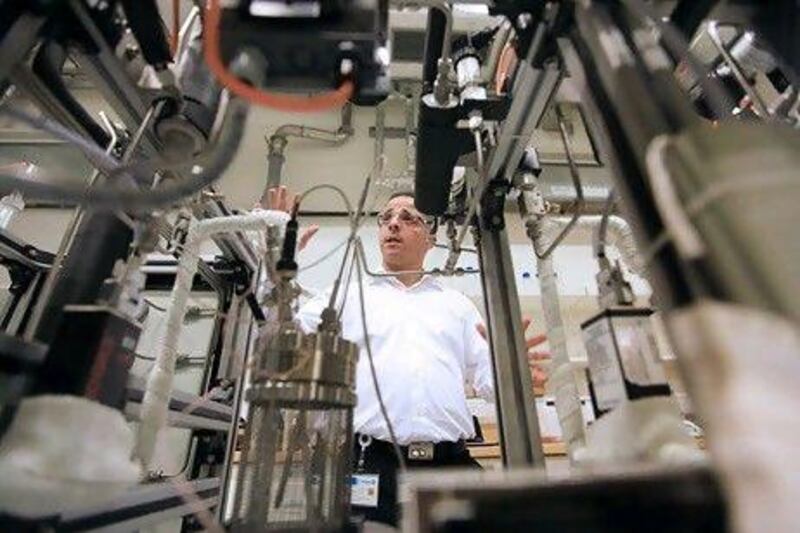Mohammed Abu Zahra surveys his bounty - a tangle of wires connecting computer controls and a reaction chamber the size of a water bottle.
This new US$360,000 (Dh1.3 million) laboratory in the basement of the Masdar Institute, the Government's clean energy university, is where the assistant professor and his team will test ways to capture carbon before it can harm the atmosphere. Their goal is to find the solvent that can soak up the most carbon.
The work is part of an Abu Dhabi-wide effort aimed at burying greenhouse gas emissions underground, including piloting carbon injection in an oilfield in the emirate and a planned 500km pipeline network connecting power plants and other industrial emitters to reservoirs.
The plans are unique to this region and rare for a field in which only a handful of industrial carbon burial projects have become reality, in countries such as Norway, Canada and Algeria.
But Abu Dhabi still needs to do more in partnering neighbouring Arabian Gulf nations, said Mr Abu Zahra, whose speciality is chemical engineering.
"If you want to see CCS [carbon capture and storage] successful in the region, you need to collaborate," said Mr Abu Zahra, who also serves on the International Energy Agency's greenhouse gas committee.
"If you work on a larger scale, then you can compete on a global level."
Nations such as Qatar have less space for underground storage and could benefit from a GCC carbon pipeline network and a shared demonstration site, he added.
Examples of GCC cooperation in other sectors exist, such as an electricity network to which the Emirates connected last year and a gas pipeline running from Qatar to the UAE.
Carbon capture and storage, however, is a more challenging subject for cooperation because it often involves injection at oilfields - closely held assets among Gulf states - and sometimes raises public fears about the safety of living on top of pockets of greenhouse gases. But sensitivity to safety and security has not stopped the GCC from holding discussions on what to do with nuclear waste.
The GCC could start by coordinating research, said Mr Abu Zahra.
Such collaboration would help to boost work that has slowed down in recent years amid the recession and a low carbon price. The price of carbon emissions traded in Europe has fallen to €3 a tonne, down from four times that last year. Executives say they need between US$70 and $100 a tonne to make large-scale CCS economical.
Projects around the world have been delayed and Abu Dhabi has not been immune as discussions over a carbon price dragged on between Masdar, the Government's clean energy company, and Abu Dhabi National Oil Company.
Last year BP pulled staff from a $2 billion hydrogen power plant that was to feed into the emirate's carbon pipeline network but has since been indefinitely put on hold. It was originally scheduled to begin operation next year.
"If you look maybe four years ago, people were more optimistic," said Mr Abu Zahra, but he added the global slowdown for CCS stemmed from external factors.
"I'm very optimistic that CCS will make a change."
The world needs the work to move quickly, according to the International Energy Agency, which estimates 3,000 CCS projects are required by 2050 to avoid the worst effects of global warming.
twitter: Follow and share our breaking business news. Follow us
iPad users can read the digital edition of business section as it was printed via our e-reader app. Click here





